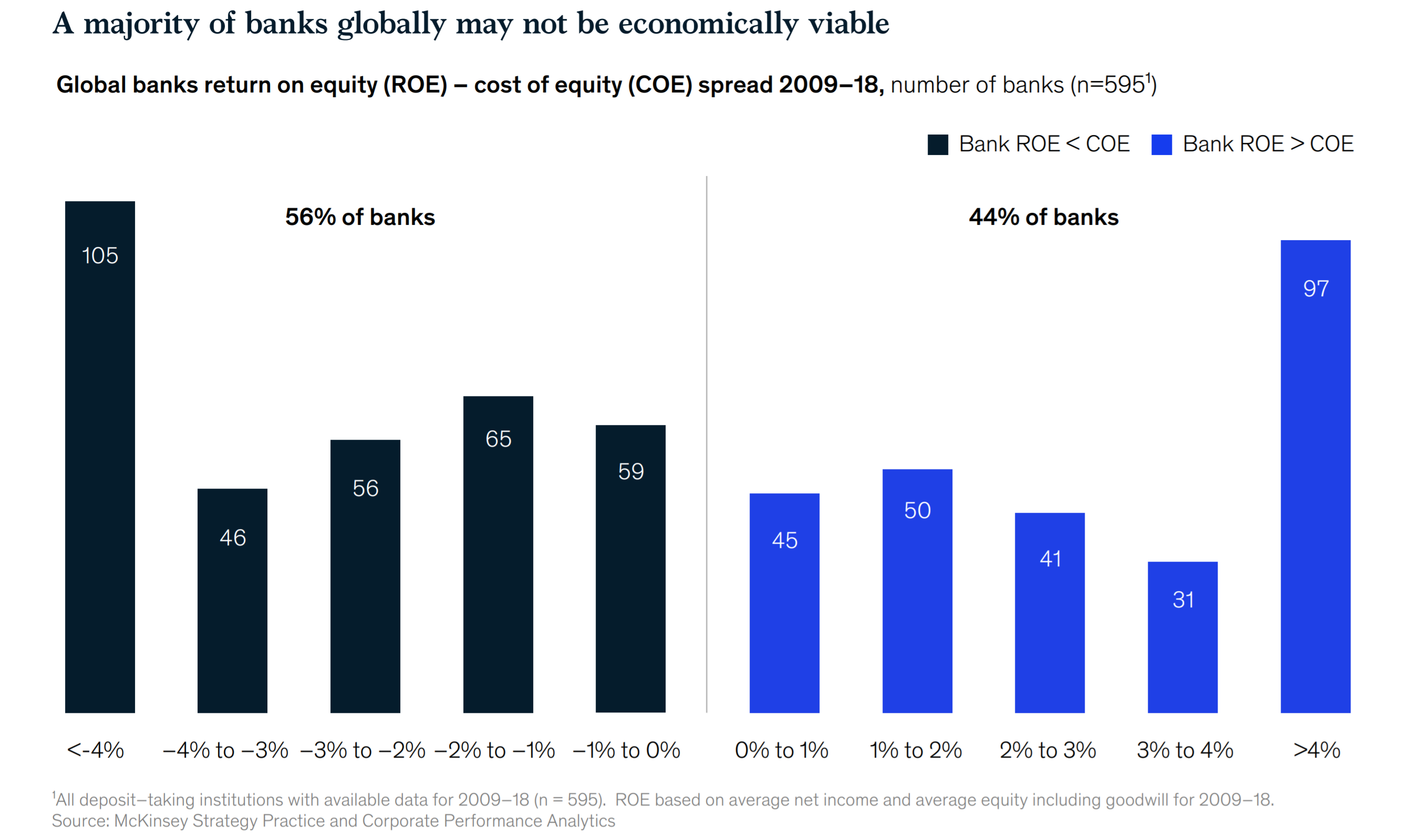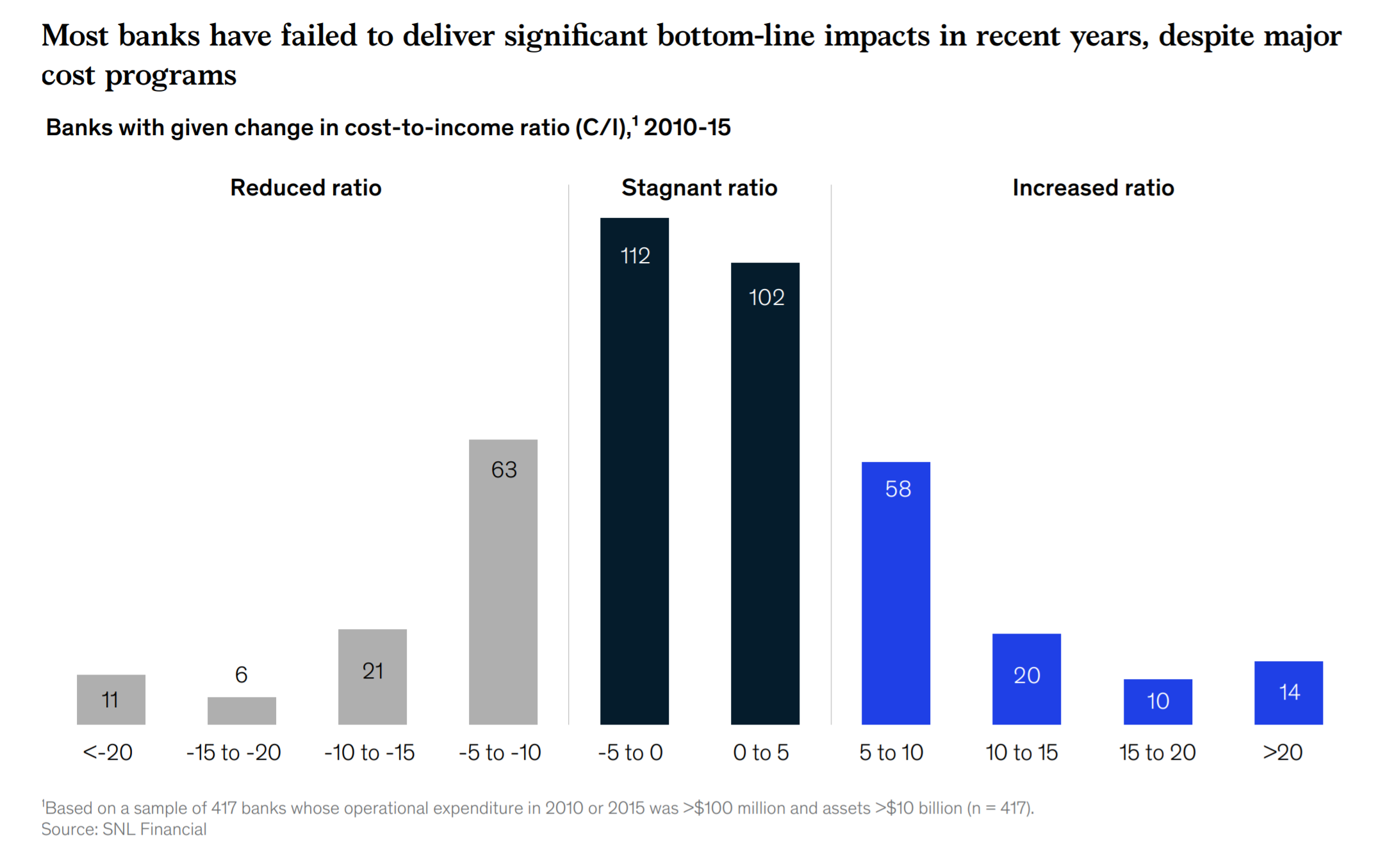Management consulting firm McKinsey & Company has published a global banking review and found that a majority of banks worldwide may not be economically viable. More than half of them still do not generate their cost of equity 10 years after the crisis and may not survive an economic downturn.
Also read: FATF Starts Checking How Well Countries Implement Crypto Standards
Majority of Banks ‘Destroy Value’
McKinsey & Company published its Global Banking Annual Review 2019 this week. The 58-page report highlights concerns over the health of the global banking sector. The firm groups banks worldwide into four broad categories, noting that “Every bank is uniquely bound by both the strength of its franchise and the constraints of its markets or business model.”
The first category is “market leaders” which are the top 20% of banks globally that capture almost 100% of the economic value added to the entire industry. The next is “resilients” which are nearly 25% of banks that have maintained leadership in challenging markets such as Europe.

The other two categories consist of troubled banks. About 20% of them are classified as “followers” which are those that have not achieved scale and are weaker than their peers, the report describes. “They are at risk from a downturn and must act promptly to build scale in their current businesses, shift business models to differentiate, and radically cut costs.”
The last category, “challenged banks,” comprises about 35% of banks globally that are both sub-scale and suffering from operating in unfavorable markets, McKinsey explained, asserting:
Their business models are flawed, and the sense of urgency is acute. To survive a downturn, merging with similar banks or selling to a stronger buyer with a complementary footprint may be the only options if reinvention is not feasible.

The firm further noted that “Risk costs are lower than ever, and yet 60 percent of banks destroy value.” These banks still do not generate their cost of equity 10 years after the crisis, McKinsey detailed, adding that “Imaginative institutions are likely to come out leaders in the next cycle” while “Others risk becoming footnotes to history.”
Time Is Running out for Many Banks
The report also outlines trends affecting the banking sector globally such as the increased usage of online banking, which grew by 13% from 2013 to 2018, according to McKinsey. The firm believes that there is room for further growth of more than 30% in many markets as consumers are increasingly willing to transact online. The rise in popularity of non-bank service providers has also presented new competition to traditional banking.
“Consumers have become accustomed to real-time and personalized services and expect the same of digital banking solutions,” the report explains. While this has mostly impacted retail banking and asset management, the same trends have started to emerge in corporate banking as well as in capital markets and investment banking, McKinsey emphasized, elaborating:
Regulators in diverse markets are also contributing to disruption in banking, especially as they take steps aimed at increasing transparency and boosting competition by lowering barriers to entry.
Chira Barua, a London-based McKinsey partner and co-author of the report, calls this global banking problem a “do or die” moment, CNBC reported. Barua explained that a serious downturn could be catastrophic for a number of banks if they do not reinvent themselves.

“There are steps every bank can take today to change their fortunes and begin the next cycle on a stronger footing, but time is running out. Boards and management should actively consider strategic moves now instead of the cycle forcing it on them in a downturn,” the partner remarked.
Kausik Rajgopal, a senior partner at McKinsey and another report co-author, was quoted by Reuters as saying, “The industry in aggregate is not in great health, because 60% of banks don’t have returns that exceed cost of equity and we see that as a call to action.”
McKinsey’s report concludes:
The call to action is urgent: Whether a bank is a leader and seeks to ‘protect’ returns or is one of the underperformers looking to turn the business around and push returns above the cost of equity, the time for bold and critical moves is now.
Banks worldwide have been bearing the brunt of record-low interest rates which cut into their profitability. The European Central Bank (ECB) kept its key interest rate at a record low of -0.5% on Thursday. A number of banks have had to pass on the negative rate burden to their customers, such as in the case of German bank Berliner Volksbank.
Do you agree with McKinsey that a majority of banks may not survive a downturn? Let us know in the comments section below.
Images courtesy of Shutterstock, the Financial Times, and McKinsey & Company.
Did you know you can buy and sell BCH privately using our noncustodial, peer-to-peer Local Bitcoin Cash trading platform? The local.Bitcoin.com marketplace has thousands of participants from all around the world trading BCH right now. And if you need a bitcoin wallet to securely store your coins, you can download one from us here.
The post McKinsey: Majority of Banks May Not Be Economically Viable appeared first on Bitcoin News.
Powered by WPeMatico
